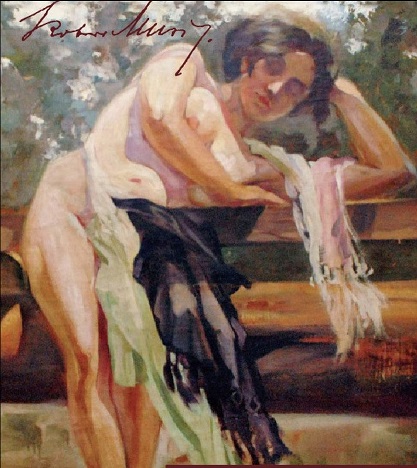Martha Musil was not only Robert Musil’s wife, but his avowed soulmate and close collaborator, as well as the model for the central figure of Agathe in The Man Without Qualities. With two translations of Robert Musil’s mystical-erotic novella dyad out this year (Unions by Genese Grill and Intimate Ties by Peter Wortsman), along with Joel Agee’s forthcoming translation of a selection of the Agathe material from The Man Without Qualities, Martha herself is gaining, indirectly, some of the attention she deserves.
Below are two passages from Robert Musil’s notebooks, translated by Philip Payne in the Mark Mirsky-edited Diaries. These passages were only located in 1980, as they had been “sewn into the lining of a coat belonging to Martha Musil.”
Walk along the Hauptallee. Martha was in a bad frame of mind and reproached me quite unnecessarily, which left me cold. “You will leave me,” [she said] “Then I’ll have no one. I shall kill myself. I shall leave you.” In a momentary state of weakness, Martha slipped far beneath herself to the level of a jealous or neglected woman with a fierce temper. In personal terms, of course, this has no significance for our relationship. But I switched off this reservation, so to speak, and gave myself over to the impressions that would arise if this were a time of disappointment. And the juxtaposition [sic] was roughly as follows: I can’t stand that, etc. Pressing matters — yes, she is amoral and you are immoral; and that amounts, in terms of the relationship, to something bourgeois. Your immorality has blinded me and is, fundamentally, of a bourgeois kind. Fascinating to watch how, in fits and starts, such ideas take on a clearer shape while one is listening to pleas and reproaches. (Of course, I personally knew all along that this was only a game.)
Robert Musil, Notebook 7, circa 1913
6.XI.41: a morning, companionable, tender, in fact, but no c[oitus].
What was it like in all those days through all those years? Where were the beds placed in all those rooms? What was it that took place as an unquestioned preamble? Was there no sense of satiety, of surfeit? Sometimes one or two signs of this, but post [coitum]. How did the transitions take place?
At any rate, the marriage that is still intact after decades serves as an example.
Few details remain in memory. Those that do remain have become lyrical: the golden “fruit of the fig” on the white sheet in M[artin] L[uther] Street. The greenish-blue blanket beneath it. The gaslight. The scarlet chalice of blossoms. See the poem, the passage in “Grigia” with its lyrical effusion.
The black hair on the white pillow in Weißgerberstraße. The head with the black plaits one morning at the window in the next room in Lofer. Nothing at all of many places: Venice, Lavarone, Pergine, Schlüsselgasse and Schlüsselgasse, Koserow, etc.
In spite of that, no doubt about being sexual and erotic people.
It has become smooth and leveled out, even statistical.
What does it look like in retrospect? This is part of the meaning of life itself.
We reawaken ourselves to ourselves in what is virtually a statistical sense. We observe ourselves according to the characteristics of the average. Occasionally enlivened by the way that spirit, too, has had its share of life.
[. . .] Personal history with the history of the “Idea.” The appropriate moment in Switzerland during the battle for Moscow.
In what way can we identify what is statistical about us in relation to what is individual?
A perspective of general interest: how does a relationship that is under the influence of sexuality change between youth and old age?
The expressive and most beautiful female body. (Reflection in some poems.) What it has to suffer. As a substitute, belonging together. The tenderness of life afterward. The importance of delicate skin and other things. Cf. the successes of old N[inon] d[e] Lenclos. What is lost when beauty disappears; what, even in physical terms, is more permanent, indeed more important than beauty.
When one is young, one is more demanding, more critical — and more susceptible to disappointment. What inhibits me is that damned poem by Goethe in Faust, Pt. II, “Philemon and Baucis.”
And here is an excerpt from that section of Faust.
Look: the foaming sea that treated
Goethe, Faust II (tr. John R. Williams)
You so cruelly, has been tamed.
Gardens bloom where it retreated;
Paradise has been reclaimed.
I was old by then, and ailing,
Found no work that I could do;
Just as my own strength was failing,
So the tide was ebbing too.
Clever masters gave instructions
Carried out by toiling slaves;
Dykes and ditches — their constructions
Made them masters of the waves.
See the lush green pastures growing,
Gardens, villages, and trees;
But now come, the sun is going,
Let us eat and take our ease.
Sails on the horizon yonder
Into harbour make their way;
Birds, however far they wander,
Seek their nests at close of day.
Now the sea is but a gleaming
Seam of blue, a distant band;
In its place you see a teeming,
Densely populated land,

Leave a Reply